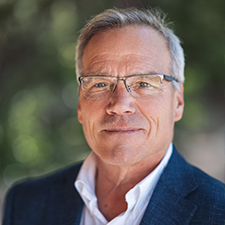
Human Centered Design

Building a change-positive culture through technology and personal touch

Chief Information Officer
Dartmouth College
At Dartmouth College, innovation isn’t confined to labs or classrooms—it extends to the very infrastructure and leadership that supports learning. Mitch Davis, Chief Information Officer, is reshaping what it means to lead IT in higher education. With a career spanning Stanford, Bowdoin, and now Dartmouth, Davis blends deep technical knowledge with a human-centered, consulting-driven approach.
In this conversation, he shares how Dartmouth’s IT department has evolved into a trusted strategic partner, why change must be client-focused to succeed, and how AI—while powerful—must be guided by human intent and integrity. Davis’s leadership philosophy is clear: if you’re not the beacon, you’re the anchor.
You’ve been a champion for transforming IT departments into client-centric consultancies. How do you frame your role as CIO?
I’ve always believed in the CIO’s Oath: Information, Technology, and Consulting—unified in purpose, diverse in thought, and focused on client value. At Dartmouth, our goal is to empower faculty, students, and staff with technology that actually works for them. That starts with listening, understanding the real problem, and building solutions that reflect human needs—not just technical specs.
Can you share a practical example of that approach?
Sure. Our classrooms were outdated and disconnected from user needs. We spoke with students, faculty, facilities, and administrators—and everyone had a different take. So we launched “Rapid Classroom Refresh,” a multi-year effort to rebuild 100+ classrooms using modular, IP-based tech. We eliminated unnecessary complexity and built open, programmable systems that empower faculty. The model was so successful that departments are now bringing their own funds and asking us to expand.
That sounds both technical and cultural. What made it stick?
It wasn’t just about hardware. We gave AV staff a path into IT careers by teaching them coding, networking, and pedagogical design. We opened new opportunities and grew our internal talent. And culturally, we shifted from a push model, where IT imposes change, to a pull model. Now, departments invite us in because they trust us to solve problems.
“If you’re not the beacon, you’re the anchor. You don’t get to have a bad day in front of your team.”
-Mitch Davis, Chief Information Officer, Dartmouth College
How do you lead during uncertainty or change—like the shift to online learning during COVID?
In crisis, people either consume or contribute. I told my team: Live each day like it’s your first. Bring energy, curiosity, and purpose. During COVID, we moved 33 systems online in under two weeks, got students connected remotely, and launched what became our online learning division. That happened because we built trust and showed up with solutions, not excuses.
You rebranded Dartmouth IT as Information, Technology & Consulting. Why?
Dartmouth loves consultants—so we became the consultants. We restructured around value delivery and elevated our staff through professional development. Our research IT group grew from 6 to 28 through cost recovery. We changed how the community sees us—no longer just IT, but a strategic partner that enables their mission.
You talk a lot about “change-positive” culture. What’s the key to achieving that?
It’s about communication and execution. We don’t make changes to make IT’s life easier—we do it to make the client’s life easier. When people see that, they start leaning into change. I recall the faculty at Bowdoin giving us a standing ovation after we implemented a new registration system. That’s when you know they trust your intent.
What’s your take on AI’s role in education and leadership?
AI is an accelerant—it can’t replace human connection or judgment. It won’t move people. People move people. Our job is to teach people how to drive, not to sit in the passenger seat. If we combine our knowledge with what AI can offer, we can do amazing things. But it takes effort. Most people won’t put in the time to drive—they’ll ride, complain, or resist.
With AI advancing so quickly, are you worried higher ed won’t keep up?
Not if we lead with intention. The challenge isn’t just policy—it’s agility. I see real transformation happening when faculty team up with AI experts to explore ideas together. Those collaborations, that nexus, is what will change higher ed. Institutions need to invest in learning before regulating. Build understanding first, then adapt the structure.
How do you see students evolving in this new environment?
Students need to learn how to learn, how to adapt, how to collaborate. A liberal arts education still matters—it’s not just about ROI, it’s about becoming. Yes, costs and questions of value are real, but we’re not just preparing students for a job—we’re preparing them to lead, to think critically, and to explore the world with empathy and curiosity.
Final leadership lesson?
If you’re not the beacon, you’re the anchor. You don’t get to have a bad day in front of your team. Your job is to energize, inspire, and serve. And if you’re not uncomfortable once in a while, you’re probably not growing. I tell my team: what’s the one call you don’t want to make today? Do it first—and do it well.


